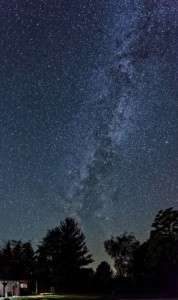Planning on staying up late (or waking up early) for this one. The Geminids is the “king” of the meteor showers. It is considered by many to be the best shower in the heavens, producing up to 120 multicolored meteors per hour at its peak. It is produced by debris left behind by an asteroid known as 3200 Phaethon, which was discovered in 1982. The shower runs annually from December 7-17. It peaks this year on the night of the 13th and morning of the 14th. The first quarter moon will set shortly after midnight leaving dark skies for what should be an excellent early morning show. Best viewing will be from a dark location after midnight. Meteors will radiate from the constellation Gemini, but can appear anywhere in the sky
The Ursids is a minor meteor shower producing about 5-10 meteors per hour. It is produced by dust grains left behind by comet Tuttle, which was first discovered in 1790. The shower runs annually from December 17-25. It peaks this year on the the night of the 21st and morning of the 22nd. This year the glare from the full moon will hide all but the brightest meteors. If you are extremely patient, you might still be able to catch a few good ones. Best viewing will be just after midnight from a dark location far away from city lights. Meteors will radiate from the constellation Ursa Minor, but can appear anywhere in the sky.

Join NOVAC and the Rappahannock County Park for a public observing session.
Audience: Members of the public, astronomy club members. Feel free to bring along any friends and family.
Volunteer Role: Bring binoculars or a telescope to share views of the planet Mars, galaxies and other deep sky objects.
Presentations:
- NOVAC member will p a 15-minute presentation by NOVAC member on how to find Mars, the M-44 beehive cluster and the M-104 Sombrero Galaxy in Virgo.
- short educational presentation put on by the Park stressing the value of maintaining a light pollution free environment.
Masks:
- not mandatory before dark unless social distancing cannot be maintained.
- required after dark.
Contact: RSVP to Torney Van Acker, Dark Sky Coordinator, at 703-250-7943 or torney630@gmail.com.

